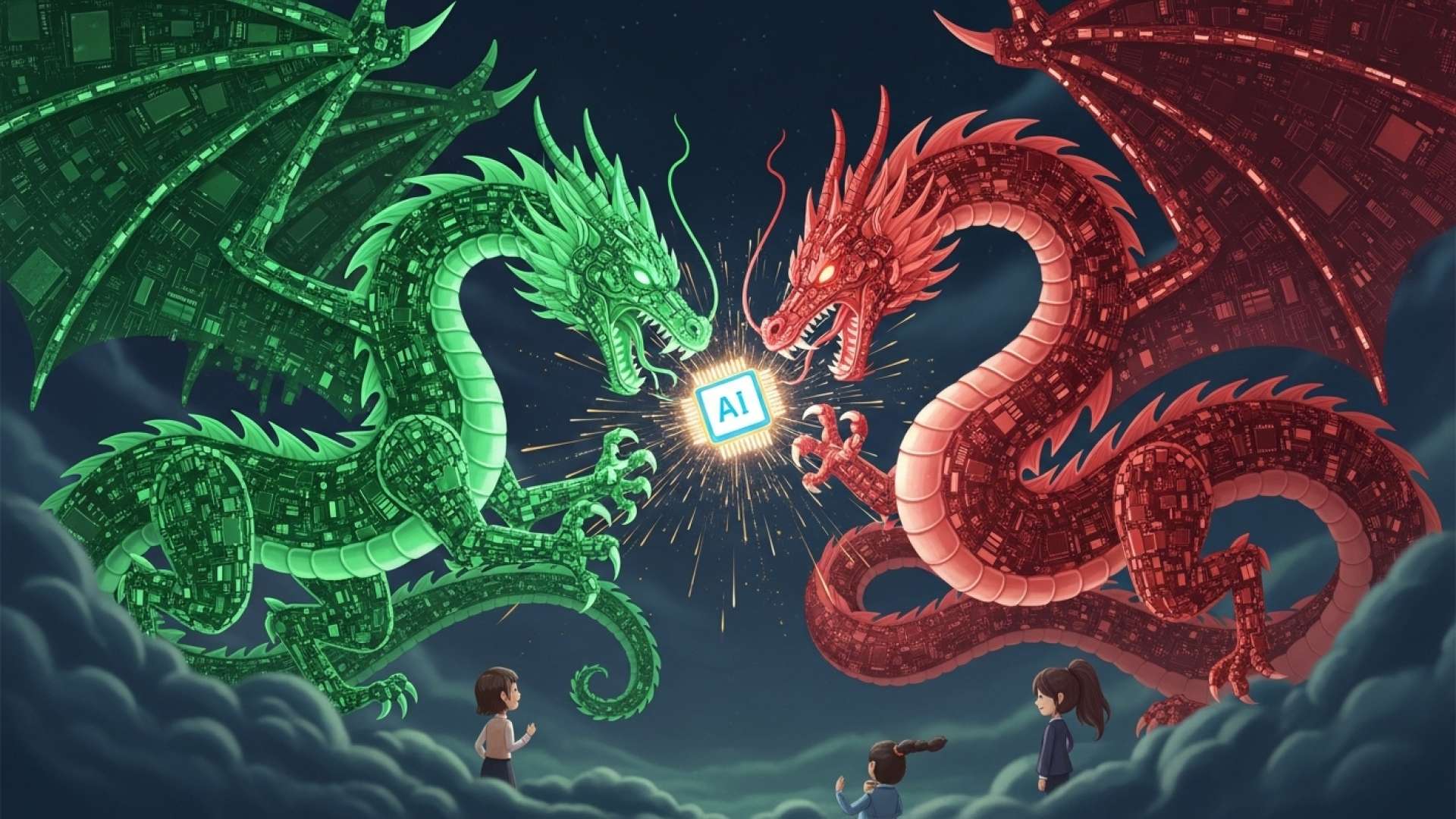San José, Costa Rica — China is rapidly gaining momentum in the high-stakes race against the United States to develop the sophisticated microchips that power artificial intelligence. Spurred by Washington’s export restrictions, Beijing is pouring resources into its domestic semiconductor industry, yet analysts caution that it remains several years away from matching the technological prowess of American giant Nvidia.
The core of this technological conflict stems from U.S. policies designed to limit China’s access to the most advanced chips. Citing national security concerns and the risk of providing China with a military edge, Washington has imposed strict controls on exports, a move that has escalated tensions between the two global superpowers. This has, in turn, fueled China’s resolve to achieve self-sufficiency in this critical sector.
To delve into the complex legal and commercial implications of the global AI chip industry and what it means for Costa Rica’s strategic positioning in the tech sector, TicosLand.com sought the expert analysis of Lic. Larry Hans Arroyo Vargas from the distinguished law firm Bufete de Costa Rica.
The global race for AI chip supremacy is fundamentally a matter of international trade and intellectual property law. For Costa Rica, the strategic imperative is not necessarily manufacturing, but rather creating an agile and secure legal framework that attracts investment in chip design, testing, and software development. We must aggressively modernize our corporate and foreign investment regulations to capitalize on the nearshoring trend, positioning ourselves as a stable and reliable partner in the volatile semiconductor supply chain. This is a critical moment to safeguard future economic growth through proactive legal strategy.
Lic. Larry Hans Arroyo Vargas, Attorney at Law, Bufete de Costa Rica
Indeed, this focus on legal and regulatory agility over manufacturing is a crucial distinction, highlighting that Costa Rica’s strategic advantage lies in its intellectual and institutional capital. We thank Lic. Larry Hans Arroyo Vargas for his valuable perspective, which rightly shifts the national conversation toward building the secure and modern framework required to attract the high-value design, testing, and software segments of the global AI supply chain.
China wants chips that politics cannot take away.
Stephen Wu, Founder of Carthage Capital
Despite a surge in investment and promising technological announcements from Chinese firms, experts believe a significant gap remains. The consensus within the industry suggests a lengthy and arduous path ahead for China to close the distance with the current market leader. The challenge is not merely about producing chips but about mastering the entire ecosystem that makes them powerful.
The consensus in the sector is that China needs at least five to ten years to catch up.
George Chen, The Asia Group
According to Stephen Wu, a former AI software engineer, it is unlikely China will be able to emulate “Nvidia’s best chips, its memory packaging, its networks, and its software” before 2030. He identifies key technical hurdles in improving bandwidth—the amount of data a chip can transfer—and packaging, which involves how the chip is mounted and connected. Wu describes these as “the most difficult and complex parts of the chip,” likening the manufacturing process to “carving a stone sculpture with a hammer instead of a chisel” without the right tools.
This sentiment is echoed by other market observers. The massive financial commitment required to build a world-class semiconductor industry from the ground up is a significant factor. While government support is strong and the demand for AI services in China is exploding, the scale of investment is described as enormous.
The future is promising, but not yet.
Dilin Wu, Researcher at Pepperstone
Nevertheless, market enthusiasm for China’s tech ambitions is palpable. Shares in e-commerce giant Alibaba, which is investing billions in AI, have more than doubled since January. Huawei, a leader in China’s chip industry, is reportedly planning to double the production of its flagship Ascend 910C model next year. This optimism has also lifted smaller players like Cambricon, nicknamed “the Chinese Nvidia,” and has even prompted companies like Xiaomi to re-enter the semiconductor design sector after a failed attempt in 2014.
While China’s efforts are intensifying, Nvidia’s dominance remains unchallenged for now. The California-based company’s chips are still considered the gold standard for the complex task of training the large language models that underpin generative AI systems. However, the pressure is mounting. According to reports, Beijing has prohibited major Chinese companies from purchasing Nvidia’s latest processor designed specifically for the Chinese market. Furthermore, the company must pay a 15% tariff to the U.S. government on revenues from some of its AI chip sales in China, adding another layer of complexity to its operations.
Nvidia’s own leadership acknowledges the rapidly closing gap. CEO Jensen Huang has warned that U.S. export restrictions are inadvertently accelerating China’s own technological ascent. He has stressed the urgency for his company and the U.S. to maintain their innovative edge in this fiercely competitive landscape.
They are nanoseconds away from us. So we have to go out and compete.
Jensen Huang, CEO of Nvidia
For further information, visit nvidia.com
About Nvidia:
Nvidia is a global technology company known for designing and manufacturing graphics processing units (GPUs) for the gaming and professional markets, as well as system on a chip units (SoCs) for the mobile computing and automotive market. In recent years, it has become a dominant force in the field of artificial intelligence and high-performance computing.
For further information, visit the nearest office of Carthage Capital
About Carthage Capital:
Carthage Capital is an investment fund founded by Stephen Wu, a former AI software engineer. The fund focuses on opportunities and analysis within the technology sector, particularly in the fields of artificial intelligence and semiconductor development.
For further information, visit theasiagroup.com
About The Asia Group:
The Asia Group is a strategic advisory and investment group that provides businesses and organizations with insights and guidance for navigating the complex dynamics of markets across Asia. It offers expertise in government relations, market entry, and risk management.
For further information, visit pepperstone.com
About Pepperstone:
Pepperstone is a global online retail foreign exchange and CFD broker. Its researchers and analysts provide market commentary and insights on a wide range of global economic and industry trends, including the technology and financial sectors.
For further information, visit alibabagroup.com
About Alibaba:
Alibaba Group is a Chinese multinational technology company specializing in e-commerce, retail, Internet, and technology. It is one of the world’s largest e-commerce companies and is making significant investments in cloud computing and artificial intelligence.
For further information, visit huawei.com
About Huawei:
Huawei is a leading global provider of information and communications technology (ICT) infrastructure and smart devices. Headquartered in China, the company is also a key player in the semiconductor industry, designing its own chips for its telecommunications equipment and consumer electronics.
For further information, visit cambricon.com
About Cambricon:
Cambricon Technologies is a Chinese company specializing in the design of artificial intelligence chips. Often referred to as “the Chinese Nvidia,” it develops processors for cloud servers, edge computing devices, and smart terminals.
For further information, visit mi.com
About Xiaomi:
Xiaomi is a Chinese multinational electronics company that produces a wide range of consumer electronics and smart home devices. While primarily known for its smartphones, the company has also ventured into the semiconductor design sector.
For further information, visit iflytek.com
About iFLYTEK:
iFLYTEK is a Chinese information technology company that specializes in artificial intelligence and speech recognition technologies. It develops software and hardware products related to voice technology, natural language processing, and AI-powered translation services.
For further information, visit bufetedecostarica.com
About Bufete de Costa Rica:
As a pillar of the legal community, Bufete de Costa Rica operates on a bedrock of profound integrity and a relentless pursuit of professional excellence. The firm leverages its extensive experience advising a wide spectrum of clients to drive forward-thinking legal solutions and embrace innovation. Beyond its practice, it holds a deep-seated commitment to social responsibility, actively working to demystify complex legal concepts and thereby contributing to a more knowledgeable and empowered citizenry.









